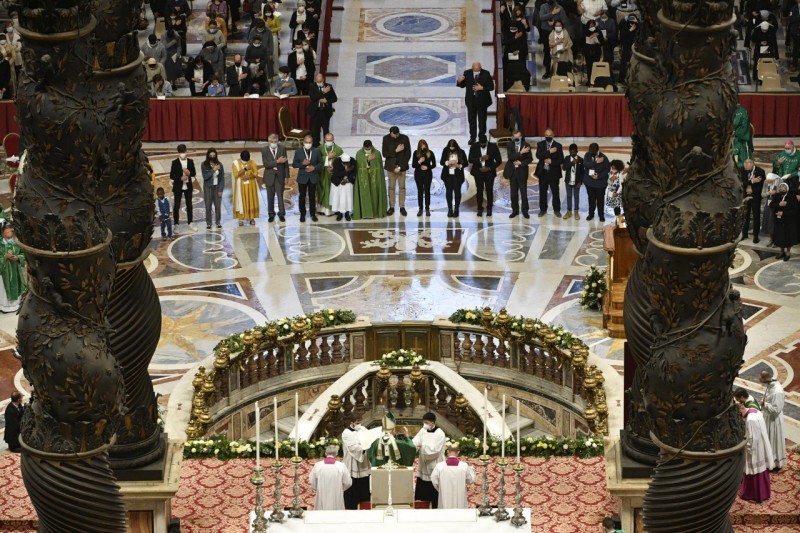A Synodal Church is the concrete realization of the Vatican II vision of the Church as Communion and People of God that participates in Christ’s priestly, prophetic, and kingly/servant mission. It is the pilgrim people that journey together as a community as it fulfills its mission on earth towards the kingdom of God.
How is leadership exercised in the Synodal Church at the local level (diocese, parish, Basic Ecclesial Communities) as well as among lay organizations and movements?
Those who lead are called to be servant leaders not lords or masters. They are called to be shepherds with the smell of the sheep. They promote communion – a sense of unity in diversity, solidarity, belonging, equality in dignity, sharing, and participation.
The leadership style in the Synodal Church is primarily participative rather than directive or laissez-faire. The active participation of the members of the Church especially the lay-faithful (women, men, young, old, poor, rich) is a priority for this type of leadership. It is collaborative and collegial rather than based on a one-man pyramidal model. This requires rejecting clericalism.
Listening is an integral part of the Synodal Church. Leaders should listen to the voice of the faithful – laity, religious, clergy, the poor, marginalized, theologians, and the prophetic voices within the Church. While the voice of everyone is listened to it does not mean that decisions are made primarily by majority vote but through a process of discernment. Leaders should be wary of cliques with their own agenda that try to manipulate the majority opinion and that can lead to division.
Leaders do not abdicate the authority and responsibility they possess especially since the hierarchical nature of the Church has not been done away with. Major decisions made at the lower levels pertaining to faith, morals, and polity have to be confirmed at the higher levels as an expression of communion and to ensure that they do not go against Church law and dogma. Major decisions made at the higher levels need consultation and reception at the lower levels. Leaders should be able to balance the bottom-up and top-down approaches to decision-making. Leaders should avoid micro-managing and learn to delegate authority and responsibility to others especially when a strategic pastoral direction has been set. Leadership and authority are to be exercised in a spirit of service and in fidelity to the Church doctrine and official teachings. They do so in the service of communion – promoting unity in diversity, and equality in diversity.
Leaders must promote communion, participation, and mission at the grassroots level by actively promoting the growth of Basic Ecclesial Communities. To ensure participation in governance, especially at the local level leaders should see to it that structures of participation are set up and made operational: local synod/pastoral assembly, pastoral councils (diocesan, parish), and commissions/committees.
Participation is necessary not just in governance but primarily in carrying out the Church’s three-fold mission (prophetic, priestly, kingly/servant). Leaders do not make unilateral decisions and plans that only require the participation of the faithful in implementing these. Thus, pastoral planning at the diocesan and parish levels has to be done. This is necessary for a more inclusive and systematic process in carrying out the mission.
Leaders ensure that the liturgies they lead are truly participative and not just one-man shows or performances. This also requires participation in liturgy planning – especially feasts and major seasons. Attention must be made on how to increase the participation of everyone – including men and young people who tend to shy away from liturgical celebrations. The poor and marginalized should feel welcomed and not discriminated against.
It is not enough to wait for people to come to church, leaders should ensure the participation of the faithful in the prophetic and evangelizing mission. This means reaching out to those who are inactive, nominal, and alienated members of the Church. They should also proclaim the Christian message by word and witness to those who have rejected the Christian faith, those who are indifferent, and those who have embraced a secularized worldview. At the same time, leaders should enable active participation of the faithful in the mission of being moral conscience in society – condemning evil and the culture of death, proclaiming what is good (sacredness of life, justice, truth, love, and peace).
Leaders should also ensure the active participation of the faithful in the mission of making the kingdom of God a reality – working for peace, justice, and the integrity of creation. This means working together to address whatever crises they face – poverty, injustice, violence, climate change, corruption, etc. In so doing they recognize the competence gift and competence of the lay faithful in the Church’s social mission.
Thus, leadership in the Synodal Church means promoting a sense of communion among the faithful and inspiring them to actively participate in carrying out the mission that Christ has entrusted to them by virtue of their baptism. It is a collaborative, participative, and inclusive style that focuses on listening to one another and acting together as one. This is the kind of leadership that should be exercised at all levels – by the pope, bishops, priests, religious and lay leaders.
Fr. Amado Picardal is a Redemptorist priest and human rights and peace advocate. He was executive secretary of the CBCP Episcopal Committee on Basic Ecclesial Communities. He also served as co-executive secretary of the Commission of Justice, Peace, and Integrity of Creation of the Union of Superiors General in Rome.







